 |
 |
|
Home →
Booklist
Booklist - Books by Tom Brown Jr.
This website has no official or
informal connection to the Tracker School or Tom Brown Jr. whatsoever |
|
|
|
Biographical, Stories, and Teachings
(listed in the order that they were published)
|
|
|
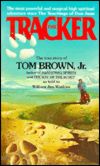 |
The
Tracker - The Story of Tom Brown Jr. as Told to William Jon Watkins
1978, ISBN 0-425-10133-9
Tom's first book. In it he tells his story, from meeting his
teacher Stalking Wolf as a child to various incidents in his life as
an adult. Tom relates his experiences with quick mud, body
control, tracking, the feral dogs of the Pine Barrens, Boy Scouts,
lost people, poachers, bears, and an entire year spent in the wilds
living with what the Earth offered, plus more.
"The first track is the end of a string.
At the far end, a being is moving; a mystery, dropping a hint about
itself every so many feet, telling you more about itself until you can
almost see it, even before you come to it. The mystery reveals itself
slowly, track by track, giving its genealogy early to coax you
in. Further on, it will tell you the intimate details of its
life and work, until you know the maker of the track like a lifelong
friend." -- From Chapter 1.
|
|
| |
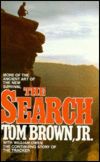 |
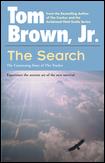 |
The Search
- The Continuing Story of The Tracker
1980, ISBN 0-425-09353-0
This book deals with the philosophy Tom has garnered and fostered from
the American Indian as well as with his unique relationship with
nature. In the preface Tom speaks of this philosophy.In this book Tom tells more stories of his life as a naturalist,
tracker, and survivalist, including more detail about his year in the
wilderness by himself. He also tells of the formation of his
school, The Tracker School.
|
|
| |
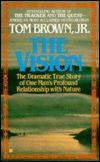 |
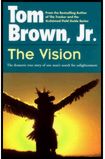 |
The Vision
1988, ISBN 0-425-10703-5
From the Introduction: "There is a world beyond that of our
everyday physical, mental, and emotional experiences. It is a
world beyond the five senses, and different than the realm of the
imagination. It is the world of the unseen and eternal, the
world of spirit and vision.....Part of what this book is about is
breaking down the complications and the inaccurate misconceptions that
modern man has of the spiritual world."
|
|
| |
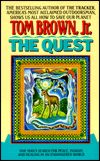
|
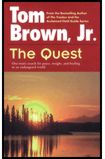
|
The Quest
1991, ISBN 0-425-12660-9
From the Introduction: "The spirit of wilderness, born into
those who seek the quiet places in the temples of creation,
unencumbered by the shackles and comforts of society, is the only
reality. We escape to the wilderness to find truth,
enlightenment, and peace....But soon man must come back to society to
live his Vision and to share the wisdom of the wilderness. It is
the coming back that begins man's real quest, the quest of living a
life of purity amid all that is artificial and polluted...."
"This book is a journey, a journey of flesh and spirit, from the
world of the purity of wilderness to that which is impure, distorted,
and destructive: the world of modern society. It is a book about
the teachings of Grandfather and about Vision."
|
|
| |
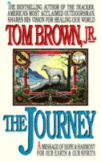 |
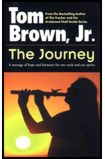 |
The Journey
1992, ISBN 0-425-13364-8
In this book, Tom continues the spiritual "Journey".
From the Introduction: "Many religions and philosophies
today are too cluttered in custom and ceremony, shackled by dogma, and
no longer work because of all the spiritual pollution and
distortion.....It was Grandfather's quest to strip away these
complications and distortions, and to get at the simple workable truth
-- the common thread of reality and truth that runs through all
philosophies and religions of the world....."
"Grandfather so often told me I should take all things to the
temples of Creation to test them out. If they are real, if they
are true for everyone, if they are simple, then they are a universal
truth."
|
|
| |
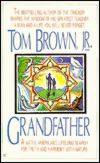
|
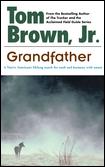
|
Grandfather - A
Native American's Lifelong Search for Truth and Harmony with Nature
1993, ISBN 0-425-13804-6
This is the story of Tom's teacher and mentor, Stalking Wolf, also
know as "Grandfather". This book brings the teachings
of the preceding books together as it lightly touches some of the
origins of these teachings.
From the Introduction: "Grandfather was an
anachronism. He did not belong in the space and time that I knew
him. His wisdom does not fit into modern society but is the call
to wilder times and places where all things are real.....His world was
that of nature and eternity."
From Chapter 1: "As I see it, Grandfather had just three
missions in life. His first mission was to try to learn,
preserve, and pass down as many of the old skills of survival,
tracking, and awareness as possible, and to do so by living with the
earth with as little as he could.....His second quest in life was to
preserve the ancient spiritual wisdom, not only of his people, but
anyone who lived close to the earth....His final quest was to learn
all that he could from every philosophy and religion."
|
|
| |
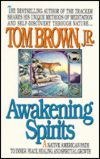 |
Awakening Spirits
1994, ISBN 0-425-14140-3
This book more or less covers the material taught at the Philosophy
class at the Tracker School.
From the Preface: "This book is basically written in
three parts. The first part tells the story of how Grandfather,
Stalking Wolf, arrived at the basic philosophy; the second part deals
with how I learned the basic techniques and skills of the spirit; and
the final part teaches the reader how to integrate them into his daily
life. After all, what good is a philosophy and the power of the
spirit if one cannot use it on a constant daily basis?"
|
|
| |
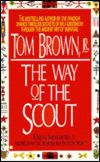
|
The Way of the
Scout - Nature's Path to Spiritual Discovery
1995, ISBN 0-425-14779-7
From Chapter 1: "It became abundantly clear to us right
from the onset that Grandfather would teach a skill in two different
ways. For instance, he would show us a particular shelter for
the classic survival situation, then after we had mastered that
shelter he would go beyond and into the realm of the scout. He
would add, "Now if you want this shelter to become invisible on
the landscape and thus to all eyes, then you must build it in this
way." He would then demonstrate to us the way the shelter
would be modified to fit the secretive aspect of scout life....."
"To the scout, the wilderness had to be his home. He had to
live in perfect balance and harmony with creation and follow its
laws. From his smokeless fires to his invisible shelters,
everything had to blend into the flow of life so that there was no
disruption in that flow."
|
|
| |
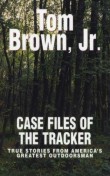 |
Case Files of the Tracker
by Tom Brown Jr.
Released late 2003. |
|
|
|
|
|
Field Guides & Instructional
(listed in the order that they were published) |
|
|
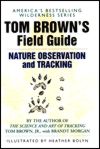 |
Tom
Brown's Field Guide to Nature Observation and Tracking
1983, ISBN 0-425-09966-0
Tom's primer on tracking and nature observation, including macro
pressure releases.
From the Introduction: "Part I of this book discusses
some attitudes and habits that will help you strengthen your awareness
of nature....Part II of this book is a discussion of the ancient art
of animal tracking.....how to recognize and follow a wide variety of
animal tracks -- including human -- on almost any kind of
terrain."
|
|
| |
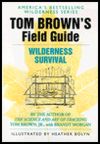 |
Tom Brown's Field Guide to Wilderness Survival
1983, ISBN 0-425-10572-5
A primer for wilderness survival without modern tools, this book
covers topics from one's attitude in a wilderness survival situation,
through the "sacred four" of shelter, water, fire, food, to
tools and crafts.
|
|
| |
 |
Tom Brown's Field Guide to Living With the Earth
1984, ISBN 0-425-09147-3
This book continues where the previous one left off. It
outlines techniques for living in a "primitive" lifestyle
indefinitely, in harmony with the earth.
From the Introduction: "Living with the earth in its
fullest sense is much more than mere survival. It is also more
than the frenzy and desperation that passes for life in much of the
modern world. Living with the earth is an intimate belonging,
like the connectedness of a well-rooted tree."
|
|
|
|
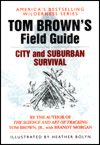 |
Tom Brown's Field Guide to City and Suburban Survival
1984, ISBN 0-425-06815-3
This book completes
the survival picture by covering survival in cities, amongst the works of humans.
Tom applies the "sacred four" of wilderness survival to an
urban environment.
From the Introduction: "The last thing I want to do is
dwell unnecessarily on disasters and discomforts.....I have not
limited the discussions in this book to emergencies and
disasters. I have put just as much (if not more) emphasis on
understanding the city environment, living frugally and thoughtfully,
knowing how things work, gaining confidence and control in one's life,
and becoming familiar with the machines and systems that are so much a
part of it. This, too, is a logical extension of the survival
philosophy. For survivalists do not feel like victims or cogs in
a machine. They feel at home in their environment, wherever it
might be."
|
|
| |
 |
Tom Brown's Guide to Wild Edible and Medicinal Plants
1985, ISBN 0-425-10063-4
Unlike most field guides, this one has a story of some sort about each plant, usually
about an experience Tom had with it, or a story from Stalking Wolf
("Grandfather") about the plant. The first part of the
book deals with how to approach nature in an attitude of harmony, to
gather the plants with a caretaking attitude. The second part
covers the edible and medicinal uses of 44 different plants.
In the Introduction, Tom shares with us a life-changing story in
which he realizes that taking the life of a plant to feed ourselves is
not much different than taking the life of an animal for the same
purpose.
|
|
| |
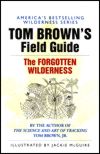 |
Tom Brown's Field Guide to the Forgotten Wilderness
1987, ISBN 0-425-09715-3
We usually think of wilderness areas when we think of Nature. This book by Tom is
about finding Nature in our own backyards and similar places. He
covers the suburbs, urban areas, and the country.
As usual, it
includes interesting stories as well. The lives of many animals,
birds, and insects are covered.
|
|
|
|
 |
Tom Brown's Field Guide to Nature and Survival for Children
1989, ISBN 0-425-11106-7
An indispensable guide to helping children appreciate our Natural world.
From the Introduction: "As I look at society, schools,
and the children of today, I see an extreme need. Most of what
is taught to our children is lopsided, feeding only the logical mind,
while doing nothing for children's awareness, creativity, relationship
to nature and life, or for cultivating spiritual needs....This book
does not instruct about all these areas -- only the closeness to and
oneness with the earth."
|
|
| |
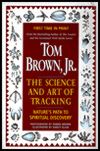 |
The Science and Art of
Tracking - Nature's Path to Spiritual Discovery
1999, ISBN 0-425-15772-5
In this field-guide style book on pressure releases, Tom talks about the lessons he has taught us about tracking and
expands upon them. "Tracking lets us unlock the secrets of each animal we
follow, and in turn, to become more aware of our own lace in nature and the world.
It is a journey of discovery that engages the senses, awakens the spirit and
enlightens the soul," he says.
|
|
|
 |
|